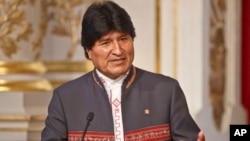Bolivian President Evo Morales' plan to change the constitution to allow him to stay in power until 2025 by running for another re-election at the end of his current term has divided the country, although polls show he may have enough support to win.
Last week Congress approved a referendum to take place on Feb. 21, 2016, a yes or no choice as to whether the two-term limit should be changed.
Critics accuse his administration of corruption and waste and say his latest re-election plan is anti-democratic.
He is already on his third term, after a court ruled that his first term preceded a constitutional rewrite. Morales, a former coca grower, became Bolivia's first indigenous leader in 2006 and won a landslide re-election last year.
If allowed to run for another five-year term from 2020, he would be able to extend his brand of "indigenous socialism" under which he has nationalized key industries such as oil and gas to finance welfare programs and build roads and schools.
"Morales has given stability and sustainability to the economy and the political system and has allowed a climate of investment and economic growth that we have to sustain in the coming years," Planning and Development Minister Rene Orellana told Reuters on Thursday.
The president has set out an agenda that runs to 2025 and allowing him the chance to stay on until then would provide "continuity," said Orellana.
Morales' most fervent supporters are the previously marginalized Aymara and rural Bolivians, who have seen their power, influence and wealth increase under his administration.
The Aymara, who have traditionally eked out an existence as llama herders on the high altiplano near the Peruvian border, are Bolivia's second-largest indigenous group.
A survey in anti-Morales newspaper Pagina Siete showed a likely outcome of the referendum as neck and neck, although an IPSOS poll last month indicated Morales had 49 percent support versus 39 percent rejection.
"In the urban centers there is a great rejection of the reform of the constitution and a rejection of the re-re-re-election of Evo Morales," said David Crispin, a provincial opposition politician.
As the campaign gets under way, the government is out with advertisements trumping Morales' successes, while the walls of La Paz's wealthier areas are daubed in Bolivian flags and graffiti simply saying 'No'.





